每日观察:关注Gametek起诉社交游戏公司专利侵权(8.17)
1)索尼影视日前发布其首款Facebook游戏《The Hotel Transylvania Social Game》,以便为公司即将上映的动画电影《怪物旅店》造势。
这款游戏是索尼新社交游戏工作室自主开发的产品,它取材于该电影内容,支持玩家创建、管理、装饰和维护自己的怪物旅店。为吸引客人,玩家需在后院“养殖”僵尸以取悦主顾。
除此之外,索尼还与PlayFirst合作推出该电影iOS衍生游戏《Hotel Transylvania Dash》(结合了《美女餐厅》系列的玩法),其社交游戏工作室计划每年推出一两款新游戏,下一个项目将于2013年4月亮相。
2)据Paid Content报道,日前有一家名为Gametek的公司在加州起诉Facebook、Zynga、EA等多家社交游戏公司,声称后者侵犯其代号为7076445的美国专利(与虚拟货币和虚拟商品有关)。
该公司于2000年9月29日申请这项专利,并于2006年7月11日获批该专利,其专利发明者为Shawn D.Cartwright,专利描述是“支持创造、绑定以及交易优势(例如,场景功能及元素等)的系统和方法”。
报道称该专利权原为Theados Corporation所有,后来移交给加州控股公司Gametek LLC。
Gametek LLC现已委托Acacia Research Group LLC公司(主要帮助原发明者及资源有限的小型公司处理专利侵权问题)协助处理此案,通过Acacia网站可得知,此案起诉对象还包括6waves、Lolapps、Big Viking Games公司以及《CityVille》、《Crime City》、《FarmVille》和《Mafia Wars 2》等游戏。
该起诉文件要求被告停止侵犯Gametek专利权,并向原告补偿及支付2.5%的所有收益分成(从原告2006年获得该专利时算起,一直到2020年为止)。
有被告开发者表示,此举是社交游戏领域面临的一大威胁,因为许多公司在游戏开发初期基本上会亏损,最多也只能免强保持收支平衡,如果再扣除这一专利使用费,社交游戏开发商运营处境将更为艰难。
3)据gamaustra报道, Quantic Dream高管David Cage(游戏邦注:其代表作包括《暴雨》以及即将发布的《Beyond:Two Souls》)在最近采访中表示,他认为当前游戏行业已患上彼得潘综合症(指不愿长大的症状),需要更多冒险的勇气,目前市场上充斥太多第一人称射击游戏,以及怪兽/外星人僵尸题材的游戏,游戏行业应有所成长和突破。
4)据gamasutra报道,育碧公司日前宣布推出自己的数字发行平台Uplay PC,将与Valve旗下的Steam和EA同类服务Origin展开竞争。
用户可通过Uplay PC桌面客户端注册一个Uplay帐号,从中购买实体及可下载游戏内容,免费增值游戏,使用成就管理、云存储、好友列表及聊天系统等功能。
该公司刚进入数字发行市场,但其Uplay社区目前在各个平台已有3500万以上注册用户,而EA的Origin上线一年在Windows和iOS平台注册用户为2100万(计划向Mac、Android、Facebook和网络电脑开放服务);发布至今已9年的Steam在PC和Mac平台有4000万用户。
5)初创公司Goko日前推出一个面向HTML5游戏开发领域的平台(该项目已运营数月,最近才正式公布消息),将向资源有限的小型开发商提供游戏开发、发布和盈利解决方案等服务,并从其中销售额中进行部分抽成。
Goko SDK现已正式上线,该平台包含积分排行榜、成就管理、游戏托管、虚拟商品、虚拟商店等功能。为验证HTML5技术的可行性,Goko还向Facebook、Google+以及Goko.com网站发布公开测试版本的HTML5卡牌游戏《Dominion》。据报道,该游戏在iPad上呈现的效果堪比原生应用。
Goko将于今年秋季与合作伙伴推出15款游戏,该公司已在A轮融资中筹得800万美元,并利用这笔资金购买来自Mayfair Games、Rio Grande Games以及Reiner Knizia等公司的150款纸牌及桌游的改编权,计划将更多授权纸牌及桌游推向HTML5游戏领域。(本文为游戏邦/gamerboom.com编译,拒绝任何不保留版权的转载,如需转载请联系:游戏邦)
1)Sony’s new studio checks Facebook game fans into Hotel Transylvania
by Joe Osborne
Esteemed guests, welcome to Hotel City–err, sorry, we mean Hotel Transylvania. Sony Pictures Interactive has launched its first Facebook game ever, lazily titled The Hotel Transylvania Social Game. Of course, the game is designed to build hype for the company’s upcoming animated flick, Hotel Transylvania, though it seems to take some cues from the hotel simulators of old.
In The Hotel Transylvania Social Game, players build, manage, decorate and maintain their very own Hotel Transylvania. In order to staff the join, you’ll have to “grow” zombies in the backyard, and entertain guests with “torturous amenities,” a release reads. And while most branded social games are created by developers for hire, this was crafted entirely in house by Sony’s new studio.
“Our goal was to build a game that is fun to play while taking advantage of the full range of social tie-ins that experienced gamers expect from social games,” Sony Pictures Interactive senior VP of production Scott Nourse said. “We are proud of our achievement in that regard and are excited about the framework we have built which will enable us to build more games in the future.”
Sony has made a major branding play for Hotel Transylvania with not just this, but a PlayFirst-developed iOS game, Hotel Transylvania Dash based on its hit Diner Dash franchise. The company has big plans for its social game studio, with ambitions of pumping out one to two social games annually and its next project debuting in April 2013. We wonder what that could be.(source:games)
2)Gametek sues major social games companies over virtual currency patent
Emanuel Maiberg
A company called Gametek has filed lawsuits in the Southern District of California against Facebook, Zynga, Electronic Arts, and many other companies in the social games business, claiming infringement of its U.S. patent No. 7,076,445, which relates to virtual currency and goods.
The patent, which was filed on September 29, 2000 and issued July 11, 2006 credits Shawn D. Cartwright as the inventor of “a system and methods allowing the creation, integration, and transaction of advantages (e.g. desired environment features and/or elements).”
A page from patent 7,076,445
Paid Content reports that the patent was assigned to to Theados Corporation, which in turn transferred the patent to a California shell company called Gametek LLC which filed the complaint.
We traced Gametek LLC to Acacia Research Group LLC, which partners with “primarily individual inventors and small companies with limited resources to deal with unauthorized users but include some large companies wanting to generate revenues from their patented technologies.” We have reached out to Acaia but they have yet to respond.
From Acacia’s website
The complaint names companies like 6wave, Lolaps, Big Viking Games as well as specific games like CityVille, Crime City, FarmVille, and Mafia Wars 2.
The complaint mainly asks that the Court issue a permanent injunction to stop the defendants from infringing on Gametek’s ‘445 patent and to entitle Gametek to 2.5 percent of all revenue backdated since they acquired the patent (2006), up until 2020.
Gametek claims it owns the patent for these types of transactions
A source on the side of the defendants told us that this is a huge threat to social gaming: “During early stages of game creation, social game companies run on a loss and at best a razor-thin profit. A further percentage taken off from *all* social game developers – as this will inevitably lead to – would be crippling.”(source:insidesocialgames)
3)Heavy Rain director tells game industry it’s time to grow up
by Christian Nutt
“I mean, how many first person shooters can you make? … There’s a moment where we need to grow up.”
- David Cage, director on Quantic Dream’s Beyond: Two Souls
In a new interview at Gamescom, the outspoken director of Heavy Rain talked to Gamasutra about his frustration with the industry and its refusal to move to more mature subject matter.
At the show, the developer showcased his studio’s upcoming title, Beyond: Two Souls, an adventure game starring actress Ellen Page. The story follows the lead character’s life from age 8 to age 23.
“I think we should have more courage in our industry and take more risks, because I think this is what the industry needs now. I mean, how many first person shooters can you make? How many monsters/aliens/zombies can you kill in games? There’s a moment where we need to grow up. We need to grow up,” Cage told Gamasutra.
“I often think that the industry suffers of the Peter Pan syndrome. It’s the fact that we don’t want to grow up, so we stay kids. But there is a moment where you need to grow up as an industry. And you cannot keep up with the Peter Pan syndrome. You need to grow. And I think this is the right time,” he said.
The full interview with Cage will be live on Gamasutra in the near future.(source:gamasutra)
4)Ubisoft debuts its own Origin-like platform
by Eric Caoili
Ubisoft is pushing its way into the digital distribution platform space, launching Uplay PC, a new service that will compete with the game shops/communities of Valve’s Steam and Electronic Arts’ Origin.
This application builds on Ubisoft’s similarly named Uplay online community for its games, as the desktop client requires users to register for a Uplay account. It features a shop for purchasing physical and downloadable games, free-to-play titles, achievements, cloud saving, a friends list, and a chat system.
Uplay PC also acts as a single area where users can launch their games from (instead of opening them from individual game launchers), just like EA’s Origin or Valve’s Steam services — though Uplay PC so far only supports Ubisoft-published titles.
While Ubisoft is entering the digital distribution market relatively late compared to those competitors, the publisher has been building its Uplay community and positioning it for this service for some time now — it currently has over 35 million registered Uplay members across various platforms.
For comparison, Origin has 21 million registered users across Windows and iOS (EA plans to also launch the service on Mac, Android, Facebook, and online-connected TVs) since launching a year ago, and the 9-year-old Steam has 40 million users on PC and Mac.
Ubisoft has placed a lot of emphasis on its digital strategy in recent years with numerous free-to-play and downloadable releases. That approach has paid off for the company through considerable growth in its sales, despite many other publishers suffering due to the weak retail market.(source:gamasutra)
5)Startup backs HTML5 devs with new platform – and a whole bunch of card games
by Kris Graft
A startup wants to ignite the HTML5 game development scene with the introduction of a new platform that looks to help game makers develop, distribute and monetize their games.
The twist is that a key part of this young company’s strategy is the acquisition of a whole bunch of licenses for board and card games.
The name of the company is Redwood City, CA-based Goko, which will serve both as a consumer-facing site for HTML5 games, as well as a development platform. It’s been operating in stealth mode for months, but is making its official debut today.
Goko’s hook is an appeal to the smaller developer who has limited resources. Goko will offer these developers the means to create, launch, and monetize their games, while taking a cut of the sales.
“The idea is that we want to give the tools to the independent, smaller developers so they can actually build the kinds of games that the bigger developers make,” CEO Ted Griggs told Gamasutra. “Places like Zynga and [Electronic Arts] have really powerful internal services and tools that they use for their games, but the smaller developers don’t typically have that.
“To get people to move to HTML5, you need a good set of services and capabilities, but you also need the right kind of business models around it, and that’s what we’re trying to do,” Griggs said. “People forget that game developers need to eat.”
Goko’s SDK is available today. The platform includes leaderboards, achievements, game hosting, virtual goods, virtual stores and other features.
HTML5 skepticism
The draw of HTML5 is the potential to create a game using a single code base, and easily port a game to multiple platforms. But there’s still plenty of skepticism around HTML5′s capabilities in terms of performance (just look at how major social game dev Wooga dropped HTML5 earlier this year).
Griggs is aware of that skepticism. “If you’re looking at HTML5 to do 3D WebGL-enabled games on every platform, then you’re going to be very disappointed,” he laughed. “If you’re going to pick games that fit HTML5′s cross-platform capabilities — that’s why we have focused initially on card and board games — you won’t have any problem at all.”
In order to back that up, Goko launched the open beta for an HTML5 version of the card game Dominion, playable across Facebook, Google+ and Goko.com. The developer also has an MMO, Catan World, in beta. Showing Dominion at trade shows on an iPad, people mistook it for a native app, said Griggs.
In total, Goko and its partners are working on 15 games slated to launch this fall. The company, which has raised $8 million in series A funding, also said it has acquired rights to 150 games from card and board game license-holders including Mayfair Games, Rio Grande Games and Reiner Knizia. The developer is looking for partners to bring more licensed card and board games to HTML5 using Goko. (Goko also uses key components from Ludei’s game development platform.)
Brian Howell, VP of marketing made sure to stress that even though a game is HTML5-based, it can still be released on popular storefronts. The company is taking Dominion, putting it in an HTML5 wrapper, and is also releasing it on Apple’s App Store and on Google Play. The key selling points again — flexibility and a broader addressable market.
“You can have an HTML5 game, but you don’t have to ignore where the players actually are,” said Howell. (source: gamasutra)

























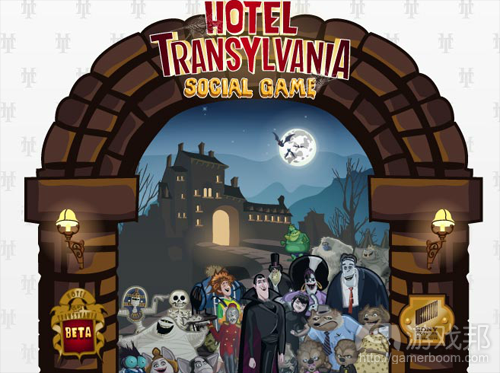
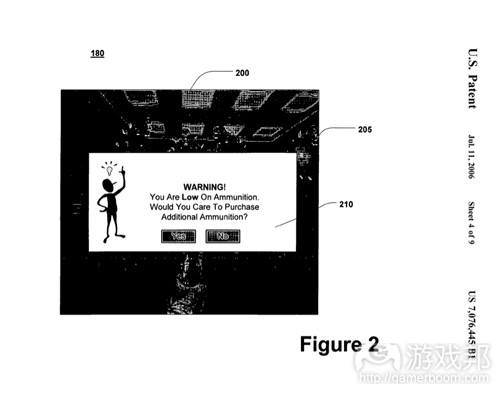
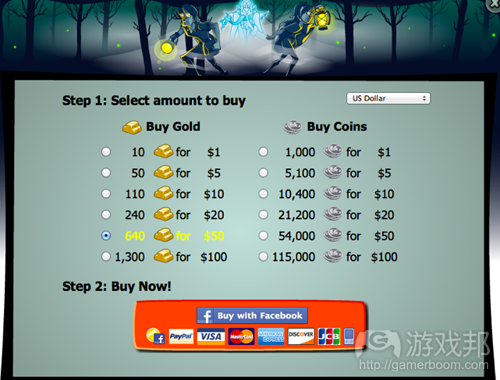

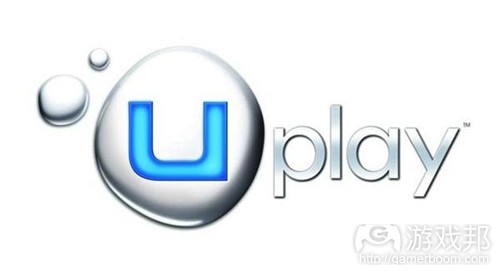
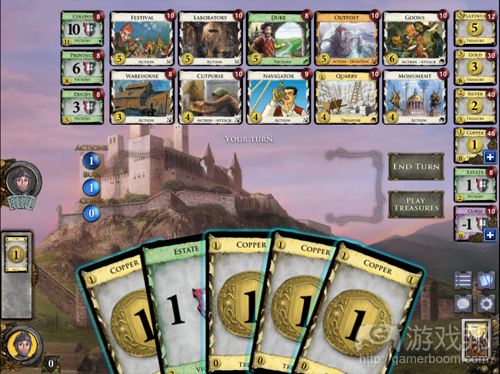














 闽公网安备35020302001549号
闽公网安备35020302001549号